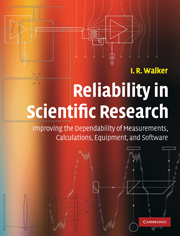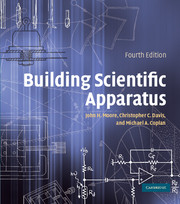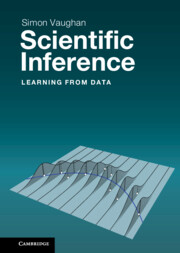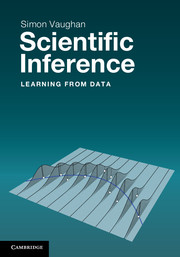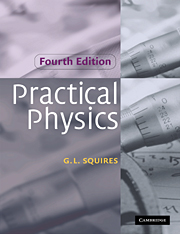Reliability in Scientific Research
Covering many techniques widely used in research, this book will help researchers in the physical sciences and engineering solve troublesome - and potentially very time consuming - problems in their work. The book deals with technical difficulties that often arise unexpectedly during the use of various common experimental methods, as well as with human error. It provides preventive measures and solutions for such problems, thereby saving valuable time for researchers. Some of the topics covered are: sudden leaks in vacuum systems, electromagnetic interference in electronic instruments, vibrations in sensitive equipment, and bugs in computer software. The book also discusses mistakes in mathematical calculations, and pitfalls in designing and carrying out experiments. Each chapter contains a summary of its key points, to give a quick overview of important potential problems and their solutions in a given area.
- Provides advice that will help researchers prevent and solve problems in their research, saving valuable time
- Covers many techniques that are commonly used in research, including: electronics, optics, computation and cryogenics
- Includes summary points for each chapter, making it easy to obtain a quick overview of difficulties and their solutions in a given area
Reviews & endorsements
'I will definitely keep this book in my laboratory as a general reference for experienced laboratory members, and particular chapters will be assigned reading for new research students.' MRS Bulletin
'This very complete, thoroughly researched tome is about how to improve one's research by eliminating or lessening the impact of errors. I would recommend it to anyone involved in research that uses the equipment that the book discusses.' Computing Reviews
'This should be compulsory reading for all embarking on a career in experimental science, for if its advice is heeded a great deal of waste of time and effort will be avoided.' Contemporary Physics
'Having a wise mentor share his two decades of lab experience would be very helpful for a newbie researcher. The next best option is to consult this book, which distils the same advice in print. The writing is clear and succinct, and it is backed by key references.' Optics and Photonics News
'The book covers a multitude of applications, from soldering to software design, including chapters on mechanical devices, vacuum systems, cryogenics, optics, electronics and even wiring. Each comprehensive chapter comes complete with references and the volume has a 24-page, double-column index. Walker, a researcher at Cambridge University's Cavendish Laboratory, is pragmatic and straight-talking from the start. in his analysis of 'simplicity' he laments that 'the imperative to keep things simple is usually well understood, but not always practised'.' Engineering and Technology
'The advice provided is clear, concise and practical. It includes, ways to reduce experimental and mathematical errors, precautions to prevent damage and deterioration caused by equipment transport, guidance on when and how to design and construct your own equipment, and how to minimize RF interference, challenges faced when connecting and routing cables, and recommendations for computer hardware and software design and much, much more. Each chapter concludes with a valuable summary of key points, making it easy to identify and retain relevant information. This is backed up by an extensive list of references, books, and useful websites ... Graduate students in my lab have obtained indispensable guidance from many chapters of this book, and it has become a useful addition to our library. We particularly liked the all too short final chapter, which uses some real-world examples to highlight the pitfalls of experimental research, and of course how to overcome them.' Stephen Pistorius and Mario Solis Nepote, Physics in Canada
Product details
January 2011Hardback
9780521857703
610 pages
252 × 194 × 30 mm
1.47kg
64 b/w illus. 8 tables
Available
Table of Contents
- 1. Basic principles of reliability, human error, and other general issues
- 2. Mathematical calculations
- 3. Basic issues concerning hardware systems
- 4. Obtaining items from commercial sources
- 5. General points regarding the design and construction of apparatus
- 6. Vacuum system leaks and related problems
- 7. Vacuum pumps and gauges, and other vacuum-system concerns
- 8. Mechanical devices and systems
- 9. Cryogenic systems
- 10. Visible and near-visible optics
- 11. Electronic systems
- 12. Interconnecting, wiring, and cabling for electronics
- 13. Computer hardware and software, and stored information
- 14. Experimental method.

